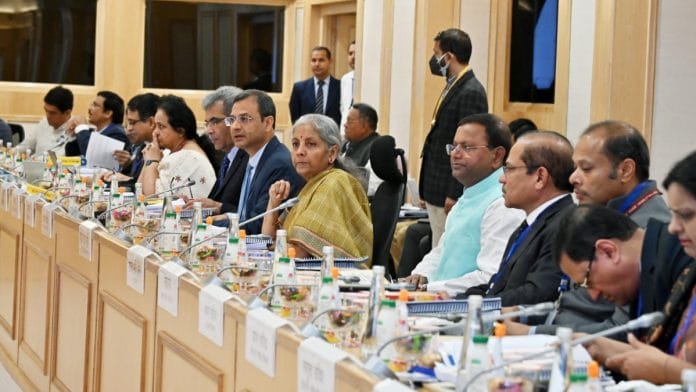New Delhi: The Ministry of Finance has decided to clear Goods and Services Tax (GST) compensation worth Rs 16,982 crore owed to states, Union Finance minister Nirmala Sitharaman announced Saturday.
Speaking at a press briefing following the 49th GST Council meet held earlier in the day at Vigyan Bhawan in the national capital, Sitharaman said, “The entire due of pending balance of GST compensation will be cleared as of today. As of 31 May, we had cleared all the dues, there was something left in the name of dues for June. Even that is getting cleared.”
“In other words, the total pending balance of GST dues which is Rs 16,982 crore for June 2022 will be cleared,” she said.
Last week, Sitharaman had requested state governments to bring in efficiency in the processing of paperwork required to claim GST dues. The delays, she had said, were a result of non-availability of authentication certificates issued by the Auditor General of India to respective state governments — as agreed upon by states and the central government.
At the press briefing Saturday, the minister clarified that the central government releases 90 per cent of GST compensation owed to states even if the states are awaiting the authentication certificates. “Waiting for the certificate does not mean that we don’t release anything at all. Nearly 90 per cent of the compensation is released. Only 5-8 per cent is retained subject to the AG certificate reaching us,” she said.
Sitharaman also stated that the amount due to states will be released from the central government’s own resources.
“Although this amount is not really available in the compensation fund, as of today, we have decided to release this amount from our own resources and the same amount will be recouped from the future compensation cess collection. So the amount is not with us, but we are still giving it with our own resources,” she said.
Also Read: Govt pitching simplified income tax regime but a basic complexity remains
15 states haven’t submitted GST certificates
Besides the announcement about GST compensation, she said the government has received authentication certificates from six other states that will be entitled to Rs 16,524 crore. These are Delhi (Rs 2,400 crore), Karnataka (Rs 7,900 crore), Odisha (Rs 834 crore), Tamil Nadu (Rs 4,200 crore), Telangana (Rs 1,265 crore), and Puducherry (Rs 42 lakh).
“With this release, therefore, the Centre would release the entire provisionary admissible compensation cess dues of five years as envisaged in the GST compensation to states in 2017. In addition, of course, Centre would also clear the admissible final GST compensation to those states who have provided the revenue figures as certified by the auditor accountant general of the states and that amounts to 16,524 crore,” she said.
Of the Rs 16,982 crore owed to states in GST compensation, about 50 per cent will go to just six states: Maharashtra (Rs 2,102 crore), Karnataka (Rs 1,934 crore), Uttar Pradesh (Rs 1,215 crore), Delhi (Rs 1,212 crore), Tamil Nadu (Rs 1,201 crore), and Punjab (Rs 995 crore).
The finance ministry further listed the names of 15 states/UTs that have not furnished their authentication certificates since FY 2017-18. These include Arunachal Pradesh, Goa, Jammu and Kashmir, Jharkhand, Kerala, Madhya Pradesh, Meghalaya, Mizoram, Nagaland, Punjab, Sikkim, Tripura, Uttar Pradesh, Uttarakhand, and West Bengal.
Sitharaman also said in the press briefing that the GST Council has decided to reduce GST on raab (liquid jaggery) from 18 per cent to nil if sold loose and 5 per cent if prepackaged. The GST on pencil sharpeners too has been reduced from 18 per cent to 12 per cent, while that on tagging devices or data loggers has been slashed from 18 per cent to nil subject to conditions.
Further, services provided by the National Testing Agency (NTA) — which conducts entrance examinations for admission to educational institutions — have also been exempted from the GST regime.
(Edited by Amrtansh Arora)
Also Read: Why Kanpur traders protested over Yogi’s GST raids — ‘heavy fine for discrepancy of even Re 1’






